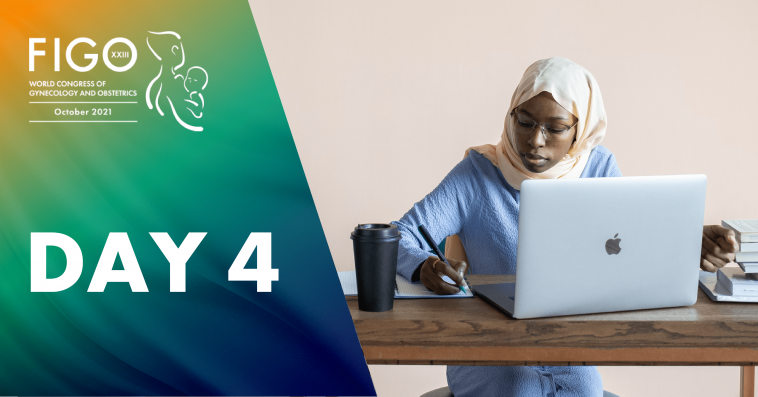FIGO 2021 World Congress Blog – Day Four
The fourth day of the XXIII FIGO World Congress started with a livestream from the Israel Forum of the FIGO World Congress. This was followed by a powerful keynote lecture on trauma-sensitive care in conflict and sessions on assisted reproductive technologies and the effects COVID-19 on cancer screening and management, amongst others. The day was concluded by the Africa and Middle East Regional Evening, which covered maternal mortality, FGM, cervical cancer and much more.

Live from the Israel Forum: Urogynaecology
The fourth day of Congress was opened by a session on urogynaecology, streamed live from the Israel Forum of the FIGO 2021 World Congress. Dr Shimon Ginath started the session and set the scene for the discussion on tailoring the optimal management for apical compartment prolapse. Dr Tal Fligelman took the stage first to explain vaginal approaches to surgery, followed by Dr Jonia Alshiek who reviewed the abdominal approach. The session ended with a brief but extremely engaging panel discussion.
Keynote: the urgent need for trauma-sensitive care
We followed with a keynote lecture from Dr Monika Hauser on Solidarity, Empowerment, Dignity – Trauma-Sensitive Support for Women and Girls (Not Only) in War and Crisis Zones. Dr Hauser started her lecture by stating that “when dealing with women’s health issues, it is never only the medical or psychological sides that have to be considered, but also the overall social and political context.” Her lecture focused on the need for trauma-sensitive support and care for survivors of violence, and highlighted that stakeholders at all levels of policy making and health care have a role to play in supporting their rights and needs.
The role of health care workers in responding to the climate crisis
We continued the day with a session titled Putting Out the Fire! – Managing the Risks of Extreme Heat on Maternal and Newborn Health Arising from Climate Change. This session was started by Professor Sari Kovats, who discussed the impact of extreme heat on maternal and newborn outcomes in Africa, focusing primarily on direct effects based on epidemiology. Dr Seni Kouanda followed with a talk examining how heat stress is experienced during pregnancy and in the postpartum period and presented potential avenues for addressing this.
Professor Matthew Chersich followed with a presentation containing practical advice on how clinical care can be adapted to safeguard women and newborns during heatwaves. Frances McConville gave a talk on key findings from the Lancet Planetary Health survey on “Views of Health Professionals on Climate Change and Health: a Multinational Study”, focusing on climate change as a human health issue.
The session was closed by a fascinating panel discussion with Dr Diarmid Campbell-Lendrum, Team Leader on Climate Change and Health at the World Health Organization (WHO), Dr Franka Cadée, President of the International Confederation of Midwives and Dr Jeanne Conry, FIGO President-Elect. The conversation focused on next steps and ways forward for professional organisations to support health professionals to advocate for responses to climate change.
ART in Low-Resource Countries
Later, the FIGO Reproductive Medicine Track put together a session on Assisted Reproductive Technology (ART) in Low-Resource Countries. Dr Geeta Nargund started with a presentation on natural and mild in vitro fertilisation (IVF). She highlighted how these methods are not only effective, but they are also more affordable and provide better health outcomes for women. Dr Roberto Epifanio Malpassi explored low-cost ART, looking specifically at trends in (in)fertility in the Latin American region in recent years.
Dr Angélique Rwiyereka focused her talk on a case study, detailing the institutionalisation of infertility services in a public hospital in Rwanda, sharing lessons from the success of the initiative. Dr Gitau Mburu concluded the session by sharing an update on current initiatives related to infertility by the WHO.
COVID-19 and cancer
The day continued with a range sessions, including insightful presentations on COVID and Cancer in a session put together by the FIGO Gynaecological Oncology Track. Professor Sean Kehoe opened the session with a talk on the impact of COVID-19 on cancer screening and the care of women with gynaecological cancers – focusing specifically on cervical cancer.
Dr Jalid Sehouli spoke about the effects of the pandemic on ovarian cancer and chemotherapy, underscoring the challenges for patients, physicians and care givers. Dr John Butler ended the session by providing post-pandemic recommendations, looking at clinical trials and changes in surgical techniques to identify key takeaways from this crisis for cancer treatment.
Tackling challenges for women and girls’ health in Africa and the Middle East
We concluded the day with the Africa and Middle East regional evening, co-organised by the African Federation of Obstetrics and Gynaecology (AFOG) and the Société Africaine des Gynécologues et Obstétriciens (SAGO). Focusing on community engagement, HIV, maternal mortality, HPV, FGM and more, this evening covered a wide array of issues affecting the health of women and girls in the region. This evening included politically engaged musical numbers that highlighted key issues, such as songs on cervical cancer and FGM.
It was an engaging and moving end to this day of World Congress. Recordings of all of the session will be available to watch on-demand on the Congress virtual platform within 24 hours.
To find out more about the Congress, or to register, visit www.figo2021.org.